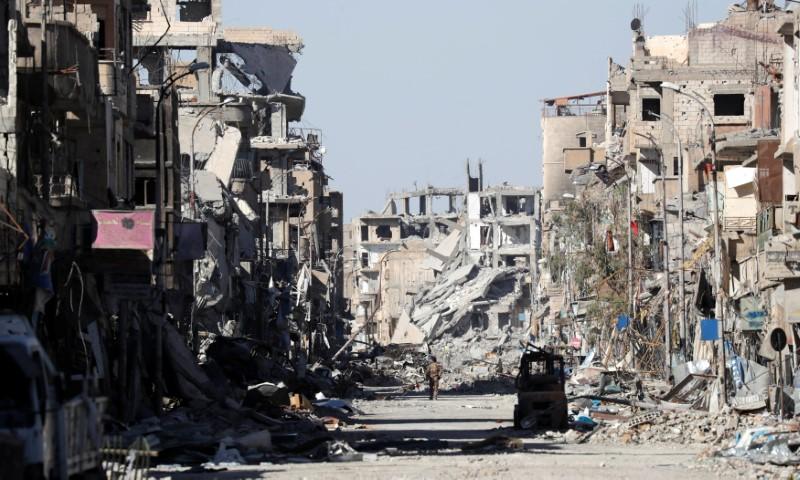
One day after a ferocious attack on a market in northern Syria killed more than 60 people, the collective silence from the three architects of an agreement to ease the fighting in Syria has raised serious questions about their commitment to protect civilians caught in the crossfire of the country’s devastating civil war.
Turkey, Russia and Iran are the guarantors of an agreement meant to freeze the lines of conflict in Syria and protect against the sort of horror that befell market-goers in the town of Atareb on Monday.
“It doesn’t seem to matter if we are bombed or not,” said Fayyad Akoush, 26, who escaped from a grocery that was damaged by the attack.
There were at least three airstrikes on the market, which destroyed one building and damaged several others, according to witnesses and the Britain-based Syrian Observatory for Human Rights monitoring group. Shoppers were crushed under the rubble or blown apart by the blasts, their limbs torn from their bodies or their heads crushed.
The Syrian Civil Defense search-and-rescue volunteers, known as the White Helmets, told The Associated Press they had given up hope of finding more survivors and were still digging for bodies of the missing more than 24 hours after the attack. They said at least 61 people were killed.
“You can see the body fragments in the rubble,” said Yasser Hmeish, a medical technician who was filming rescue efforts at the scene.
It is not — and may never be — fully known who was behind the attack, though residents and the opposition Syrian National Coalition have accused Russia, a chief military backer of Syrian President Bashar Assad. Syrians are used to identifying planes by their shape, flight patterns and weapons, though Assad’s forces also fly Russian jets. The Syrian Observatory for Human Rights said it couldn’t determine whether Russia or the Syrian government was behind the attack.
A Russian connection would not be any surprise, despite Moscow’s signing of the agreement that was supposed to put an end to a strategy of collective punishment through sieges and bombardment that has left at least 400,000 people dead and displaced 11 million — half of Syria’s pre-war population — during the seven-year civil war.
Since May, when representatives of Russia, Turkey and Iran signed a document of principles in the Kazakh capital of Astana laying out four zones of protection, the Russian air force has been implicated in numerous attacks that have terrorized civilians near the capital, Damascus, and across northwestern Syria.
In October, it launched a searing wave of strikes on towns in northwestern Syria in response to an offensive by al-Qaida-linked militants that pushed into government-held territory.
The International Committee of the Red Cross said 10 medical facilities came under attack and Save the Children said 55 of the 60 schools in the area were forced to close as children sheltered in bunkers for protection. The two NGOs did not apportion blame, in line with their practices.
More unsettling to Atareb residents was that Turkey, another signatory to the Astana document, has not raised any concerns about the market attack, despite maintaining a military presence 10 miles (16 kilometers) to the north, in the Syrian town of Darat Ezzah, as part of the de-escalation pact. Under the framework of the Astana talks, Turkey is negotiating on behalf of Syria’s rebels, while Russia and Iran are there on behalf of the government, to broker agreements to get the political process between the warring sides on track.
“There was a sense of relief that there were Turkish officers who had entered the area as part of the de-escalation agreement,” Akoush said.
Then came the attack on the marketplace, which was filled with shoppers from all around the region.
“It was spiteful, just spiteful,” said 35-year-old Atareb resident Moheeb Abdallah “In the past we would be expecting something because they were bombing across the region, not just Atareb and the market would not be so full. Yesterday it was jammed.”
“If you saw the market now, you’d say this was Hiroshima or Nagasaki,” he added.
“There were restaurants, mobile phone shops, butchers: It was a market in the full sense of the word,” Hmeish said. “It’s been completely destroyed.”
Turkey’s military entered northwestern Syria in October to monitor and enforce the de-escalation; it was pushing al-Qaida-linked factions away from its borders and monitoring a Kurdish party it says is an extension of a Kurdish separatist movement operating inside Turkey.
Turkish forces operate ground and air patrols from Darat Ezzah, according to a Kurdish fighter who spoke on condition of anonymity because he was not authorized to speak to the media.
The Turkish military did not respond to questions from the AP about what it knew about the Atareb attack.
“We are the last things Turkey could care about,” Akoush said. “We don’t know what’s happening at the political level — perhaps this is a message from Russia to Turkey or Turkey to Russia — but we’re the ones suffering for it.”
Atareb and the surrounding countryside remain outside the control of the Damascus government. Government forces retook the nearby city of Aleppo, Syria’s largest, following a ferocious assault on rebel-held neighborhoods there in 2015. Atareb’s population has swelled with the arrival of Syrians fleeing fighting elsewhere in the country’s north, with its market drawing not just townspeople but also shoppers from the countryside and nearby villages.
Jamil Saleh, the commander of the Jaysh al-Ezzah rebel group operating in northwestern Syria, said his faction was targeting government positions in response to recent attacks on civilians. Late Tuesday, Syrian state media said the Mahrada power station in the central-west part of the country had been taken offline after suffering damage from attacks by “terrorists.”




